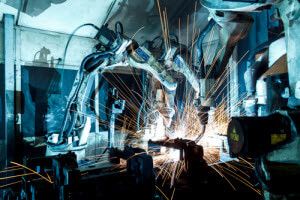Industry 4.0: How to Evolve Your Manufacturing Business to Stay Relevant & Succeed
First there was the steam engine. Then the assembly line. Now the manufacturing industry is undergoing yet another industrial revolution with Industry 4.0.
Industry 4.0, or the Fourth Industrial Revolution, focuses on making manufacturing operations easier by adding technologies that integrate systems into one data network. This allows companies to receive information regarding system performance in real time so they can better control, monitor, and respond to performance issues.
Overall, more companies have adapted to the latest Industrial Revolution. But what does Industry 4.0 mean for your manufacturing company?
Benefits of Industry 4.0
 Industry 4.0 is changing the manufacturing industry for the better. Companies adding advanced technologies to production lines have seen an increase in efficiency and a decrease in overall operation cost.
Industry 4.0 is changing the manufacturing industry for the better. Companies adding advanced technologies to production lines have seen an increase in efficiency and a decrease in overall operation cost.
On top of that, technologies like Internet of Things (IoT) devices, sensors, and cloud computing provide workers with real-time information about how each system is performing. This helps companies spot early stages of system problems and repair them before any damage occurs. Plus these devices make it easier to track inventory and shipments.
Most importantly, advanced technologies can provide more extensive repairs and reduce manual labor. For example, if a worker can’t inspect or repair a certain part of a system because it’s too dangerous, these technologies can do it for them.
Challenges of Industry 4.0
Of course, like all major industrial changes, Industry 4.0 will face multiple challenges. The most prominent concern is data security. Connecting systems to one data network and using cloud computing software can make the overall production process easier, but these technologies are more susceptible to data breaches and hacking.
However, these technologies are new. With that said, we can expect to see advancements to combat security issues in the future.
 Industry 4.0 can also cause problems in job security for many workers. Since many of the technologies are fully automated, they may replace workers and jobs in the production line.
Industry 4.0 can also cause problems in job security for many workers. Since many of the technologies are fully automated, they may replace workers and jobs in the production line.
Above all, maintaining these technologies will be costly to any manufacturing company that uses them.
How to Evolve Your Business to Stay Relevant
According to Forbes, you simply have to implement technologies that provide interoperability, information transparency, technical assistance, and decentralized decision making to become an Industry 4.0 business.
Here are a few of them:
1. Interoperability
Interoperability refers to systems that are connected to one network and can relay information to each other. These technologies can include IoT devices, sensors, and system integration software.
2. Information Transparency
Cloud computing is an easy way to ensure information transparency for your company. Cloud systems house all performance, system, and operations data on one remote server. This allows you to pull up the details you need no matter where you are.
3. Technical Assistance
Technologies like robots and drones can provide technical assistance on the production floor to improve efficiency. They can also help companies perform inspections tasks that are too dangerous for humans to do.
4. Decentralized Decision Making
Robots and automated systems are now advanced enough to understand data and make decentralized decisions on their own. Using these technologies for your company will help to prevent bottlenecks and help everything run more smoothly.
Learn more about M2M technologies that are reshaping the manufacturing business.

